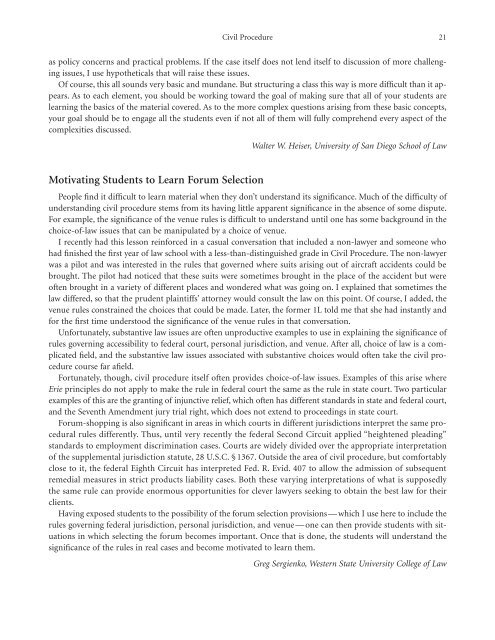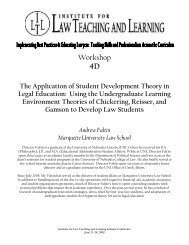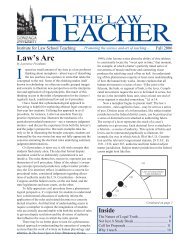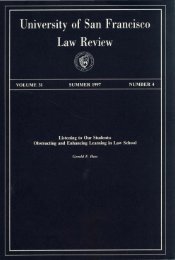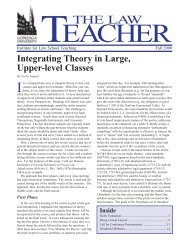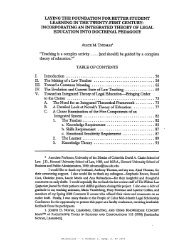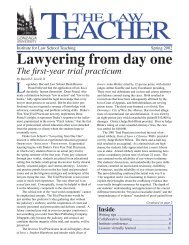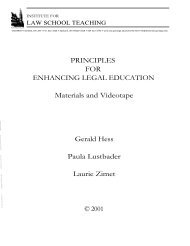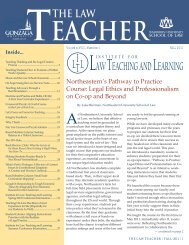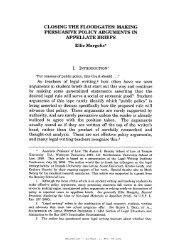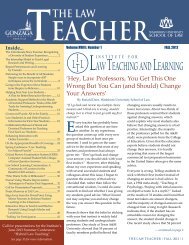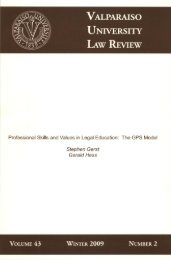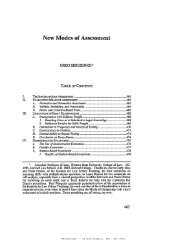Teaching the Law School Curriculum - Institute for Law Teaching ...
Teaching the Law School Curriculum - Institute for Law Teaching ...
Teaching the Law School Curriculum - Institute for Law Teaching ...
You also want an ePaper? Increase the reach of your titles
YUMPU automatically turns print PDFs into web optimized ePapers that Google loves.
Civil Procedure 21<br />
as policy concerns and practical problems. If <strong>the</strong> case itself does not lend itself to discussion of more challenging<br />
issues, I use hypo<strong>the</strong>ticals that will raise <strong>the</strong>se issues.<br />
Of course, this all sounds very basic and mundane. But structuring a class this way is more difficult than it appears.<br />
As to each element, you should be working toward <strong>the</strong> goal of making sure that all of your students are<br />
learning <strong>the</strong> basics of <strong>the</strong> material covered. As to <strong>the</strong> more complex questions arising from <strong>the</strong>se basic concepts,<br />
your goal should be to engage all <strong>the</strong> students even if not all of <strong>the</strong>m will fully comprehend every aspect of <strong>the</strong><br />
complexities discussed.<br />
Motivating Students to Learn Forum Selection<br />
Walter W. Heiser, University of San Diego <strong>School</strong> of <strong>Law</strong><br />
People find it difficult to learn material when <strong>the</strong>y don’t understand its significance. Much of <strong>the</strong> difficulty of<br />
understanding civil procedure stems from its having little apparent significance in <strong>the</strong> absence of some dispute.<br />
For example, <strong>the</strong> significance of <strong>the</strong> venue rules is difficult to understand until one has some background in <strong>the</strong><br />
choice-of-law issues that can be manipulated by a choice of venue.<br />
I recently had this lesson rein<strong>for</strong>ced in a casual conversation that included a non-lawyer and someone who<br />
had finished <strong>the</strong> first year of law school with a less-than-distinguished grade in Civil Procedure. The non-lawyer<br />
was a pilot and was interested in <strong>the</strong> rules that governed where suits arising out of aircraft accidents could be<br />
brought. The pilot had noticed that <strong>the</strong>se suits were sometimes brought in <strong>the</strong> place of <strong>the</strong> accident but were<br />
often brought in a variety of different places and wondered what was going on. I explained that sometimes <strong>the</strong><br />
law differed, so that <strong>the</strong> prudent plaintiffs’ attorney would consult <strong>the</strong> law on this point. Of course, I added, <strong>the</strong><br />
venue rules constrained <strong>the</strong> choices that could be made. Later, <strong>the</strong> <strong>for</strong>mer 1L told me that she had instantly and<br />
<strong>for</strong> <strong>the</strong> first time understood <strong>the</strong> significance of <strong>the</strong> venue rules in that conversation.<br />
Un<strong>for</strong>tunately, substantive law issues are often unproductive examples to use in explaining <strong>the</strong> significance of<br />
rules governing accessibility to federal court, personal jurisdiction, and venue. After all, choice of law is a complicated<br />
field, and <strong>the</strong> substantive law issues associated with substantive choices would often take <strong>the</strong> civil procedure<br />
course far afield.<br />
Fortunately, though, civil procedure itself often provides choice-of-law issues. Examples of this arise where<br />
Erie principles do not apply to make <strong>the</strong> rule in federal court <strong>the</strong> same as <strong>the</strong> rule in state court. Two particular<br />
examples of this are <strong>the</strong> granting of injunctive relief, which often has different standards in state and federal court,<br />
and <strong>the</strong> Seventh Amendment jury trial right, which does not extend to proceedings in state court.<br />
Forum-shopping is also significant in areas in which courts in different jurisdictions interpret <strong>the</strong> same procedural<br />
rules differently. Thus, until very recently <strong>the</strong> federal Second Circuit applied “heightened pleading”<br />
standards to employment discrimination cases. Courts are widely divided over <strong>the</strong> appropriate interpretation<br />
of <strong>the</strong> supplemental jurisdiction statute, 28 U.S.C. § 1367. Outside <strong>the</strong> area of civil procedure, but com<strong>for</strong>tably<br />
close to it, <strong>the</strong> federal Eighth Circuit has interpreted Fed. R. Evid. 407 to allow <strong>the</strong> admission of subsequent<br />
remedial measures in strict products liability cases. Both <strong>the</strong>se varying interpretations of what is supposedly<br />
<strong>the</strong> same rule can provide enormous opportunities <strong>for</strong> clever lawyers seeking to obtain <strong>the</strong> best law <strong>for</strong> <strong>the</strong>ir<br />
clients.<br />
Having exposed students to <strong>the</strong> possibility of <strong>the</strong> <strong>for</strong>um selection provisions — which I use here to include <strong>the</strong><br />
rules governing federal jurisdiction, personal jurisdiction, and venue — one can <strong>the</strong>n provide students with situations<br />
in which selecting <strong>the</strong> <strong>for</strong>um becomes important. Once that is done, <strong>the</strong> students will understand <strong>the</strong><br />
significance of <strong>the</strong> rules in real cases and become motivated to learn <strong>the</strong>m.<br />
Greg Sergienko, Western State University College of <strong>Law</strong>


